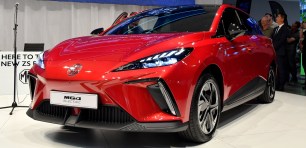
Source: Shutterstock.
In a significant development for the local EV sector, private equity group Pacific Equity Partners (PEP) has committed a massive $250 million to acquire a majority stake in EVSE, an Australian company specialising in battery charging technology.
EVSE is known for its suite of residential, commercial, and fleet charging systems – and it is set to undergo a substantial push into the Australian and New Zealand markets.
This expansion by PEP seems to be at least partially fuelled by plans to utilise the capabilities of EVSE and one of its other sustainable energy investments, Intellihub, a smart meter provider.
Brendan Wheeler, co-founder of EVSE, envisions the investment being a catalyst for the company’s growth in both Australia and New Zealand, and a means of helping to facilitate new business models, such as ‘charging as a service’ (CaaS).
This concept is becoming increasingly popular in the EV space. Back in October we saw JET Charge launch its own $24.9 million CaaS project to help encourage businesses to swap to EVs.
In the case of JET Charge, it offers businesses the option of installing and maintaining chargers both on-site and at the home of employees. It also takes care of any necessary repairs and ongoing reporting.
With about a third of the Australian charging market under its belt, EVSE has sold more than 5500 of its Ocular brand chargers and 2200 ports for its Exploran platform over the past 12 months.
Ready to scale
The investment by PEP positions EVSE to compete more effectively with major players like JET Charge in the local market.
“PEP’s strategic investment will enable EVSE to grow at scale as it continues to lead the way in the rapid electrification of Australia’s transport sector over the coming decade,” said PEP’s managing director Cameron Blanks.
“Australia is on track for 100,000 new EV sales in 2023, with continued growth year-on-year over the coming decade. Companies such as EVSE will be instrumental in supporting this rapid uptake.”
The collaboration between PEP, EVSE, and Intellihub comes at an important moment in the Australian energy and transportation sectors. PEP’s 50% ownership in Intellihub is certainly interesting.
It apparently plans to utilise EVSE’s charging technology in Intellihub’s smart meter system to create an energy management solution that will connect various electric devices to one smart meter system.
Intellihub’s recent initiatives, such as the installation of the first 50 power pole-mounted EV chargers in Sydney and the Hunter region, highlight the direction of this partnership. These chargers, which are part of a $2 million program funded by the Australian Renewable Energy Agency (ARENA), are designed to facilitate charging for EV owners without private charging access.
This addresses a critical infrastructure need. In addition to the continues range anxiety felt by Australian EV drivers, there’s also the fact many prospective EV owners can’t install a charger at their place of residence.
EVs on the uptick
EVs have been more prominent in Australia than ever in 2023. And it’s been a long time coming. The EV market in Australia got off to a decades-slow start, but it is starting to show some promising growth with more than 80,000 EVs sold in 2023. This accounted for 7.3% of all new car sales.
The introduction of more affordable EVs has been heartening, as has increased federal government support for EV infrastructure rollout.
In 2022, Labor introduced its $275.4 million Driving The Nation Fund, which aims to provide cheaper and cleaner transport across Australia.
And in the May federal budget, the federal government pledged $39.3 million to the National Roads and Motorists’ Association (NRMA) to help build 117 EV fast chargers across the country. It’s also spending $5.2 million over four years to develop national charging infrastructure, including retrofitting older multi-residential buildings with chargers.
But Australia’s recent EV efforts haven’t been without their problems.
Earlier this year, the NSW and Victorian governments decided to scrap EV purchase incentives from January 2024.
However, in the case of NSW, this has been somewhat balanced by allocating a portion of that cash to charging infrastructure. Still, both may have been nice to encourage uptake.
Then there’s the controversial ZLEV road-user charge Victoria introduced several years back that saw EVs and hydrogen vehicles (HEVs) charged 2.8 cents per km driven, with plug-in hybrids charged 2.3 cents. New South Wales was looking to introduce this same charge, however, Victoria’s version was overturned in the High Court back in October.
Hopefully, such a significant monetary investment from PEP in the private sector will help showcase the increased importance of sustainable transportation solutions and accessibility in Australia.
Handpicked for you

JET Charge launches $24.9 million subsidised EV charging initiative for business fleets




COMMENTS
SmartCompany is committed to hosting lively discussions. Help us keep the conversation useful, interesting and welcoming. We aim to publish comments quickly in the interest of promoting robust conversation, but we’re a small team and we deploy filters to protect against legal risk. Occasionally your comment may be held up while it is being reviewed, but we’re working as fast as we can to keep the conversation rolling.
The SmartCompany comment section is members-only content. Please subscribe to leave a comment.
The SmartCompany comment section is members-only content. Please login to leave a comment.